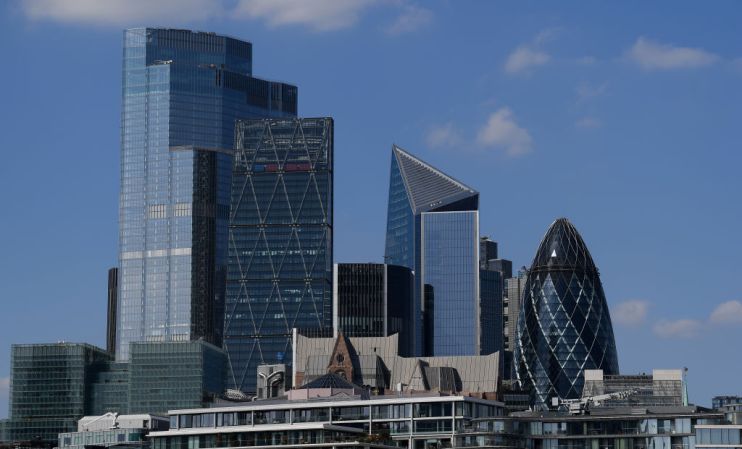FTSE 100 and US stocks fall on fears of coronavirus second wave

The FTSE 100 and US stocks have fallen as fears of a second wave of coronavirus infections spook traders and US-China tensions rise over the pandemic.
The UK’s blue-chip stock index was 1.2 per cent lower in afternoon trading. This took the FTSE 100 below the 6,000 mark which it passed yesterday for only the second time during the Covid-19 outbreak.
Also weighing on the FTSE 100 was the first-quarter GDP report. It showed that the UK economy shrank at its fastest pace since the financial crisis.
Read more: Coronavirus: UK economy slumps two per cent in first quarter of 2020
March saw GDP shrink by a record 5.8 per cent. However, markets had largely priced in a steep decline in activity.
European stocks were also trading lower. Germany’s Dax fell 1.3 per cent and France’s Cac index dropped almost 1.6 per cent. And the continent-wide Stoxx 600 was down 1.1 per cent.
US-China tensions dent FTSE 100 and global stocks
US stocks fell after the bell rang on Wall Street. The Dow Jones was one per cent lower and the S&P 500 had shed 0.7 per cent.
The falls were in part driven by US Federal Reserve chairman Jay Powell’s statement that any economic recovery “may take some time to gather momentum”. He said it would be dictated by progress fighting the coronavirus pandemic and suggested further fiscal stimulus.
US stocks tumbled yesterday, with the major indices falling two per cent as new coronavirus cases emerged and tensions with China increased.
Stocks sold sharply in the last hour of trading on Wall Street after Republican Senator Lindsay Graham proposed legislation that would allow the US to sanction China unless it gave a full account of events leading up to the coronavirus pandemic.
Investors around the world fear another flare up of US-China tensions. They could lead to tariffs that would likely hold back the global economic recovery from coronavirus.
“US markets had a miserable session last night with losses in the region of two per cent on the Dow Jones and S&P 500,” AJ Bell investment director Russ Mould said.
“That negativity extended across the UK, Europe and parts of Asia on Wednesday, with investors worried about a potential second wave of coronavirus infections.”
Second wave fears hurt European stocks
Investors have also been frightened by clusters of new coronavirus cases in countries that appeared to have their outbreaks under control. New cases have been reported in China, Hong Kong and South Korea.
US medical chief Anthony Fauci added to the gloom yesterday when he spoke to lawmakers. He warned that opening up US states prematurely would lead to “needless suffering and death”.
Michael Hewson, chief market analyst at online trader CMC Markets, said: “There is rising apprehension as various economies start to take baby steps out of lockdown that a secondary wave on infections, will cause politicians to slam on the brakes.”
Such action would “bring an end to the wave of optimism that has seen equity markets trade strongly off their March lows”.
FTSE 100 housebuilder stocks rise
UK housebuilders stopped the FTSE 100 from suffering a bigger fall as miners, tobacco giants and banks fell.
Housebuilder Berkeley rose 1.7 per cent. Barratt Developments climbed as much 1.7 per cent as the government lifted restrictions on the property market but was roughly flat in afternoon trading.
Last night the government moved to allow prospective buyers to visit estate agents and view properties after banning such activity in April’s lockdown.
The announcement prompted London estate agent Foxtons to rocket eight per cent today.
But investors are not overly confident. FTSE 100-listed Taylor Wimpey fell despite telling investors it will reopen construction sites and take staff off furlough.
Oil prices flatline as gloom returns
Brent crude oil was roughly flat on a choppy day of trading which reflected investor unease about an economic recovery. It was up 0.1 per cent at $30 per barrel this afternoon. WTI crude was 0.7 per cent higher at $26 per barrel.
Craig Erlam, market analyst at currency firm Oanda, said traders were jittery about the prospect of a sharp fall in prices as the contract for June delivery expired.
“Less than a week to go until the June contract expiry and perhaps it’s making traders a little nervous and more hesitate about joining the great rebound,” he said.
Government bond yields, which move inversely to prices, fell as investors sought “safe-haven” assets. The US 10-year Treasury yield was four basis points (0.04 percentage points) lower at 0.651 per cent.
The pound gained against the dollar, standing at $1.231 in afternoon trading. The dollar was down 0.2 per cent on an index against other currencies.